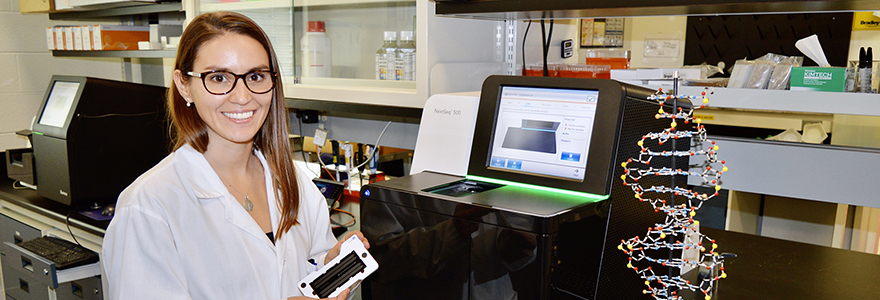Feature: Using your genes to detect arrhythmias

By Emily Leighton, MA’13
“Meet your genes.”
A tagline for 23andMe, a popular DNA testing company, invites you to get to know yourself by discovering your genes – one of many testing kits now available direct to consumer.
As demand for genetic testing increases and next-generation sequencing technology becomes more readily available, clinicians are increasingly expected to interpret the results for clinical decision-making.
It’s a troubling scenario for Julieta Lazarte, MD/PhD Candidate. She recently co-authored an editorial titled “Hazards of interpreting genetic reports” exploring the pitfalls of genetic interpretation.
“Genetic analysis is complex even for a genetics lab, so imagine a clinician on their own,” she explained. “In the piece, we recommend clinicians contact a genetic counsellor to assist with interpretation and navigating the implications for patients and their families.”
As a graduate trainee based at the London Regional Genomics Centre at Robarts Research Institute, Lazarte is no stranger to complex genetic analysis.
Her doctoral research is focused on atrial fibrillation, a common type of arrhythmia that is associated with serious complications, such as stroke. She is specifically interested in ‘lone’ atrial fibrillation, which occurs without the presence of heart disease or a heart abnormality. This type of atrial fibrillation often appears in younger patients.
Using genomic analysis, Lazarte is investigating and characterizing the underlying genetic causes associated with ‘lone’ atrial fibrillation. She discovered a series of small, common gene variants that when occurring together, increased a person’s risk of developing the condition.
This information can also be applied to patients with standard atrial fibrillation, as environmental factors, such as high blood pressure, could be masking the same underlying genetic cause.
For Lazarte, the goal is to improve early diagnosis using genetic markers.
“One of the worst outcomes for patients with atrial fibrillation is a stroke,” she explained. “If this happens, we really have failed. Early detection is extremely important, as sometimes people don’t even know they have the condition.”
Genetic markers may also lead to new treatment options, including medications that target mutations in specific genes.
Supervised by Dr. Robert Hegele, Lazarte says her training experience at Schulich Medicine & Dentistry has been world-class. “Dr. Hegele exemplifies the very best of what a clinician-scientist can be. I’m learning how to communicate with patients effectively and build those relationships,” she said.
“And seeing Dr. Hegele with the patients, he is like a celebrity,” she added with a laugh.
Lazarte was born in Argentina and moved to Canada at the age of 14. She completed an undergraduate and master’s degree at the University of Toronto.
The MD/PhD program at Schulich Medicine & Dentistry provided an opportunity to blend her interests in medicine and health research. “I enjoy training in both environments. It’s so rewarding to work and interact with patients in the clinic and then try to solve the genetic complexities in the lab,” she said.
She recently received the Frederick Banting and Charles Best Canada Graduate Scholarship from the Canadian Institutes of Health Research, awarded to high-calibre doctoral students to support their research training experience.
“It’s validating for all the hard work and energy I’ve put into my research project and it’s opened tremendous doors for me,” she said.
One of those doors is a four-month research internship with the Broad Institute of MIT and Harvard, supported by the Michael Smith Foreign Study Supplement. Lazarte is learning how to code and analyze large genetic data sets. “This opportunity is advancing the scope of my learning significantly,” she said.
Having already completed two years of medical school, Lazarte will finish her Doctor of Medicine degree after defending her PhD thesis in the coming months.
Looking ahead, Lazarte hopes to follow in Dr. Hegele’s footsteps, balancing research with a clinical practice. “Seeing how the love of scientific discovery continues to excite and energize him after decades in the field, it’s inspiring,” she said. “I hope for the same passion and excitement in my career.”








